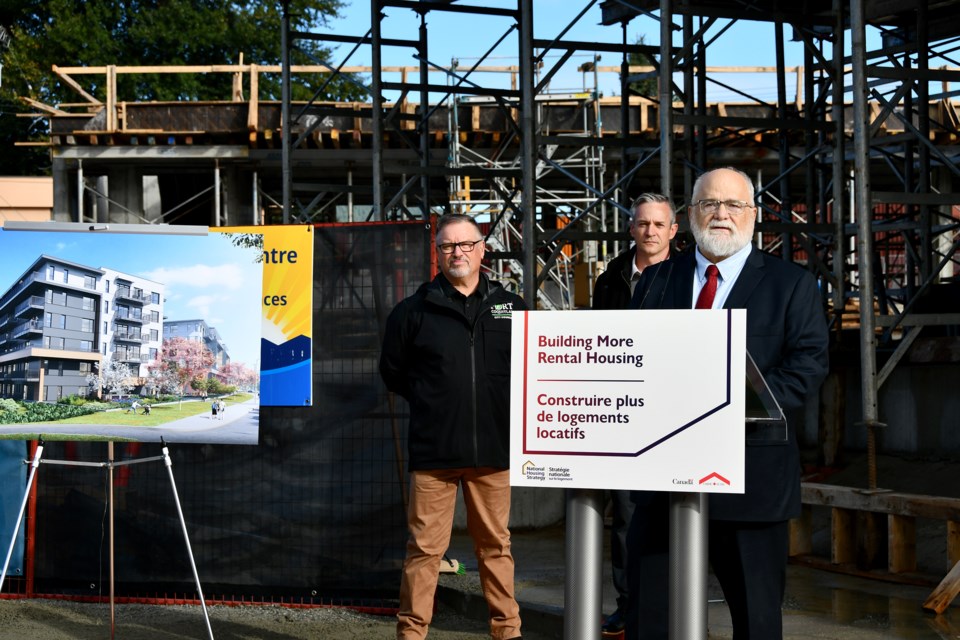Low-interest loans from the Government of Canada — not grants — were doled out today, Oct. 11, to three developers building affordable homes in Coquitlam and Port Coquitlam.
More than $267 million in federal loans were disbursed via the Rental Construction Financing Initiative (RCFi) for two projects in Burquitlam and another in downtown Port Coquitlam.
Coquitlam–Port Coquitlam MP Ron McKinnon was at the announcement for Westminster Junction where the operator, the Affordable Housing Societies, will receive $96 million in RCFi loans for 300 residential units now under construction at Kingsway and Gately avenues in PoCo.
Society CEO Stephen Bennett told the Tri-City News that renters living in its River Woods complex across the street will get first dibs on the new homes — and at the same rent they're currently paying.
The first of three wood-framed buildings in the Westminster Junction project is expected to be up by the spring of 2025.
The society has owned River Woods for about 20 years and, once Westminster Junction is fully complete, it'll be demolished for up to 400 more affordable units and a daycare, Bennett told the Tri-City News.
A 33-space daycare, to be run by the Atira Women's Resource Society, is also planned at Westminster Junction.
Besides the $1.5 million from the B.C. government for the child care centre, funding for Westminster Junction is also coming in from the City of Port Coquitlam ($300,000) and Dogwood Holdings Society ($28.9 million in cash and land equity).
Meanwhile, in Coquitlam, federal loans were also distributed for new buildings at:
- 515 Cottonwood Ave.
- 267 rental units
- $121 million in RCFi loans
- 710 Dogwood St.
- 126 rental units
- $50.3 million in RCFi loans
"These projects demonstrate the strong commitment and partnership between the federal government and the private sector," said Sean Fraser, Canada’s housing minister, in a news release.
"Through RCFi, this investment in housing will soon create hundreds of safe, well-built homes for hardworking, middle-class Canadians and add much needed supply to the rental market in the region. This is one example of the National Housing Strategy ensuring every Canadian has a safe place to call home."
Asked why loans, and not grants, are being handed out given the national housing crisis, McKinnon told the Tri-City News that the RCFi stream was the best funding fit for the three regional projects.
As for supplying supportive housing in Port Coquitlam following calls for action from homelessness experts, Coun. Glenn Pollock pointed out the "deep subsidies" for the recently opened The Alex on Prairie Avenue; however, he noted, the city is "doing as much" as it can and "as fast" as it can due to the pressures at 3030 Gordon Ave. in Coquitlam, the Tri-Cities only shelter.
New B.C. housing fund
Meanwhile, in other housing news, Coquitlam–Maillardville MLA Selina Robinson, B.C.’s minister of post-secondary education and future skills, was in Coquitlam this morning to launch the Workplace Innovation Fund.
The fund is designed to support the construction sector to help find and retain skilled labourers and to create new technologies, among other things.
Applications for grants of up to $5 million per project are open until Nov. 10.
According to the province, the construction industry is expected to post 72,700 job openings until 2032.
"We know one of the biggest challenges facing our province right now is the need to quickly grow our housing supply," said Ravi Kahlon, B.C.'s housing minister, in a news release.
"This fund will help us continue to build new homes at historic rates by closing gaps in the labour force, increasing productivity and introducing lower emissions technologies to the benefit of everyone."
As well, the provincial government is now creating a digital building permit tool to get more homes up faster.
The tool is being developed through a pilot partnership between the province, 16 local governments — including the City of Coquitlam — and a First Nations government; testing will start next March.




